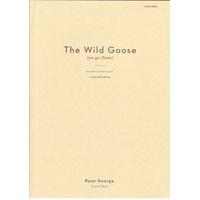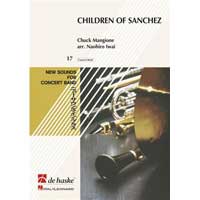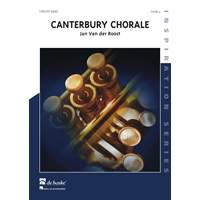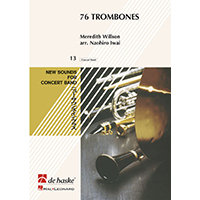ライアン・ジョージ(Ryan George)/Gr.5/10:00
ワイルド・グース(2017年版)【スコアのみ】/ライアン・ジョージ【吹奏楽輸入楽譜】

- 在庫
- 在庫あり
- 商品コード
- GOMS-90026A
- メーカー
- フォーナイン・ミュージック(Fornine Music)
ピアノとハープが編成されたオリジナル版の2014年版はこちら
2014年版から2017年版への変更点:
ハープとピアノパートをパーカッションに置き換え、オーケストレーションを変更
終結部前のパーカッションフィーチャー部分をカット(266~313小節)
管楽器の若干の編集
♪詳細情報♪
▼楽器編成▼
Piccolo
1st & 2nd Flutes
1st Oboe
2nd Oboe
(doub. English Horn in F)
1st & 2nd Bassoon
1st Clarinet in B♭
2nd Clarinet in B♭
3rd Clarinet in B♭
4th Clarinet in B♭
1st Bass Clarinet in B♭
2nd Bass Clarinet in B♭
Contra-alto Clarinet in E♭
Soprano Saxophone in B♭
Alto Saxophone in E♭
Tenor Saxophone in B♭
Baritone Saxophone in E♭
1st & 2nd Flutes
1st Oboe
2nd Oboe
(doub. English Horn in F)
1st & 2nd Bassoon
1st Clarinet in B♭
2nd Clarinet in B♭
3rd Clarinet in B♭
4th Clarinet in B♭
1st Bass Clarinet in B♭
2nd Bass Clarinet in B♭
Contra-alto Clarinet in E♭
Soprano Saxophone in B♭
Alto Saxophone in E♭
Tenor Saxophone in B♭
Baritone Saxophone in E♭
1st Trumpet in B♭
2nd Trumpet in B♭
3rd Trumpet in B♭
4th Trumpet in B♭
1st Horn in F
2nd Horn in F
3rd Horn in F
4th Horn in F
1st Trombone
2nd Trombone
Bass Trombone
1st & 2nd Euphoniums
Tuba (div.)
String Bass
2nd Trumpet in B♭
3rd Trumpet in B♭
4th Trumpet in B♭
1st Horn in F
2nd Horn in F
3rd Horn in F
4th Horn in F
1st Trombone
2nd Trombone
Bass Trombone
1st & 2nd Euphoniums
Tuba (div.)
String Bass
Timpani
1st Percussion
1st Percussion
Vibraphone
Medium Bass Drum
Firecracker Snare
Slapstick*
Tambourine
China Cymbal*
2nd PercussionMedium Bass Drum
Firecracker Snare
Slapstick*
Tambourine
China Cymbal*
Vibraphone
Medium Bass Drum
Suspended Cymbal*
Concert Bass Drum*
Triangle
Crash Cymbal*
China Cymbal*
Deep-shell Snare
Chimes
3rd PercussionMedium Bass Drum
Suspended Cymbal*
Concert Bass Drum*
Triangle
Crash Cymbal*
China Cymbal*
Deep-shell Snare
Chimes
Marimba
Splash Cymbal*
Concert Bass Drum*
Woodblock
Crash Cymbal*
Slapstick*
Splash Cymbal*
Concert Bass Drum*
Woodblock
Crash Cymbal*
Slapstick*
4th Percussion
*は1台で可能
Glockenspiel
Concert Bass Drum*
Tam-Tam
Anvil
Splash Cymbal*
5th PercussionConcert Bass Drum*
Tam-Tam
Anvil
Splash Cymbal*
Small Bass Drum
(floor tom で代用可)*は1台で可能
♪楽曲解説♪
巨匠ユージーン・コーポロン氏が率いるローンスターウインドオーケストラの委嘱のこの作品は、1600前のケルト民族と大自然の様子、彼らを取り巻く神や精霊の様子をダイナミック且つ繊細で緊張感のあるサウンドで描かれた作品です。
2017年、ミッドウエストクリニック・ファイナルコンサートに出演が決まった広島ウインドオーケストラのために、作曲家本人が申し出て、この演奏会のために彼らの編成に合わせて改訂したのが「2017年版」です。
The Celtic people who occupied the British Isles around 1,600 years ago were a people who shared a deep connection with nature and the world they found themselves in. Around this time Christianity found its way to this land and these ancients would often draw on their surroundings for symbolism. In the Celtic tradition the Holy Spirit is represented as a bird, but not as the delicate and peaceful dove found in other cultures, but as An Ge Fhiain. The Wild Goose.
Like a wild goose, they perceived the Sprit of God as wild and untamed. Geese are loud, raucous, and strong. Their honk is challenging, piercing, unnerving. They are uncontrollable, dicult if not impossible to catch, and their actions cannot be anticipated (thus the phrase “wild goose chase”). These ancient people absorbed spirituality then not as something that you captured, or something that you bent to your will. It was a pursuit, an adventure that you chased after. Their faith was one that was free and unpredictable.
Juxtaposed against the chaos of the Goose chase these ancients also had a phrase for those places where the distance between earth and the spiritual realm collapses. Locales where we are able to catch hints and glimpses of the transcendent and where the divine seems to speak the clearest. They called these destinations “thin places”.
In writing this piece I was intrigued by these two impressions: the wild and rambunctious Goose that calls us on an adventurous chase, and the tranquil, reverent thin places that the Goose leads us to. These two thoughts intertwine, sometimes gracefully and other times forcefully. The piece is written in the free-form of a fantasy overture and is built around a 5-note motif that variates throughout the allegro sections. A simple chordal hymn first stated by the horns provides the basis for the adagio segments. The Goose, represented by an antiphonally staged solo english horn, shows up at various points in the work as both the boisterous motivator and the soothing counselor. Music influences coming from the Celtic traditions are faint early on in the piece but transition to the forefront towards the end as the emulated sounds of bagpipes, penny whistles, and Irish drumming transform the 5-note figure into a reel and jig.
AN GE FHIAIN (The Wild Goose) was commissioned by Robert W. Clark as a gift to Dr. Barry K. Knezek in honor of his passion for and devotion to the Lone Star Wind Orchestra. The work was premiered by the same group January of 2014.
*In December of 2017 the Hiroshima Wind Orchestra premiered a revised version of this piece. This revision was done to accommodate this professional ensemble's specific instrumentation for their performance at the 2017 Midwest Band & Orchestra Clinic in Chicago. Because this version is orchestrated for a typical wind ensemble (winds + timpani + 5 percussion) I have decided to make it available, as it opens the piece up to groups who may not have the personnel needed to perform the original 2014 version.
The specific changes made to the 2017 version are as follows...
・The harp and piano parts were removed and their parts re-orchestrated into the percussion.
・The spatial bass drum feature was removed (this was necessary to keep the percussion to 5-players)
・The 2nd oboe now doubles the english horn solo (so only 2 oboe players are necessary).
・Minor wind edits
2017年、ミッドウエストクリニック・ファイナルコンサートに出演が決まった広島ウインドオーケストラのために、作曲家本人が申し出て、この演奏会のために彼らの編成に合わせて改訂したのが「2017年版」です。
The Celtic people who occupied the British Isles around 1,600 years ago were a people who shared a deep connection with nature and the world they found themselves in. Around this time Christianity found its way to this land and these ancients would often draw on their surroundings for symbolism. In the Celtic tradition the Holy Spirit is represented as a bird, but not as the delicate and peaceful dove found in other cultures, but as An Ge Fhiain. The Wild Goose.
Like a wild goose, they perceived the Sprit of God as wild and untamed. Geese are loud, raucous, and strong. Their honk is challenging, piercing, unnerving. They are uncontrollable, dicult if not impossible to catch, and their actions cannot be anticipated (thus the phrase “wild goose chase”). These ancient people absorbed spirituality then not as something that you captured, or something that you bent to your will. It was a pursuit, an adventure that you chased after. Their faith was one that was free and unpredictable.
Juxtaposed against the chaos of the Goose chase these ancients also had a phrase for those places where the distance between earth and the spiritual realm collapses. Locales where we are able to catch hints and glimpses of the transcendent and where the divine seems to speak the clearest. They called these destinations “thin places”.
In writing this piece I was intrigued by these two impressions: the wild and rambunctious Goose that calls us on an adventurous chase, and the tranquil, reverent thin places that the Goose leads us to. These two thoughts intertwine, sometimes gracefully and other times forcefully. The piece is written in the free-form of a fantasy overture and is built around a 5-note motif that variates throughout the allegro sections. A simple chordal hymn first stated by the horns provides the basis for the adagio segments. The Goose, represented by an antiphonally staged solo english horn, shows up at various points in the work as both the boisterous motivator and the soothing counselor. Music influences coming from the Celtic traditions are faint early on in the piece but transition to the forefront towards the end as the emulated sounds of bagpipes, penny whistles, and Irish drumming transform the 5-note figure into a reel and jig.
AN GE FHIAIN (The Wild Goose) was commissioned by Robert W. Clark as a gift to Dr. Barry K. Knezek in honor of his passion for and devotion to the Lone Star Wind Orchestra. The work was premiered by the same group January of 2014.
*In December of 2017 the Hiroshima Wind Orchestra premiered a revised version of this piece. This revision was done to accommodate this professional ensemble's specific instrumentation for their performance at the 2017 Midwest Band & Orchestra Clinic in Chicago. Because this version is orchestrated for a typical wind ensemble (winds + timpani + 5 percussion) I have decided to make it available, as it opens the piece up to groups who may not have the personnel needed to perform the original 2014 version.
The specific changes made to the 2017 version are as follows...
・The harp and piano parts were removed and their parts re-orchestrated into the percussion.
・The spatial bass drum feature was removed (this was necessary to keep the percussion to 5-players)
・The 2nd oboe now doubles the english horn solo (so only 2 oboe players are necessary).
・Minor wind edits



